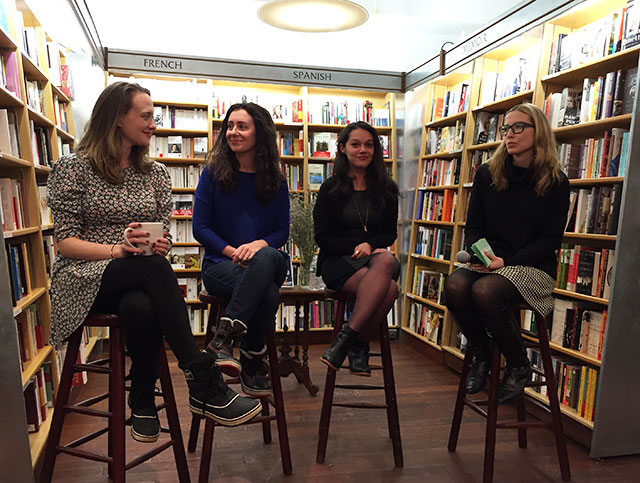
Kate Axelrod launched her debut novel The Law of Loving Others at McNally Jackson Books. She was joined by Emily Gould, author of Friendship and Una LaMarche, author of Like No Other for a panel discussion moderated by Jessica Almon.
Axelrod is a social worker by trade, and she explains that the idea for the novel came to her while doing outreach with homeless people. She starting writing the novel while in school. She was worried that she would stop writing and allow her career to take over instead of finishing a book.
Axelrod also found inspiration for characters through the people she encountered on the job. She spent many mornings driving a van around to make contact with the homeless clients. For research, she pulled from her real life experiences, many of her clients enduring psychological diseases.
For LaMarche, her inspiration was closer to home. Living in a Brooklyn neighborhood near a conservative Jewish enclave provided the curiosity. She says it was the idea of being very nearby that community and still having it be out of reach. She completed a lot of research on the Jewish community, but still says she felt like she didn’t know very much at all.
Friendship is focused on the relationship between two female friends because Gould wanted to examine how those kinds of relationships can be more important than male-female relationships. She drew from her own experience and from that of her close, real life girl friend.
Though they are talking about novels, all three women have written non-fiction as well.
“I think fiction comes more naturally,” Axelrod says. She says non-fiction is therapeutic for her, but inventing the story is easier. Of course, she adds, everything is infused with real elements, explaining, “part of you is in it.”
Non-fiction strikes LaMarche is easier though. She says its easier to write things that she has experienced, but its novels that are cathartic for her because she gets to make everything up.
Gould straddles the middle ground taking a ‘grass is always greener’ approach: “Whenever I’m writing fiction, I pine for the built in structure of non-fiction.”
Gould says she doesn’t feel confident in creating the artificial worlds for fiction. The complexity of creating a world from scratch is a challenge, though she is experimenting with varying those rules with her current project. There is a moment when a writer must convince herself of her own bullshit, Gould says.
“Sometimes I get struck by something in my life,” Axelrod says, explaining inspiration. She describes those things as seeds that evolve. “I’m not really good at plot.”
“I’ll have a seed of an idea in real life and it sort of unfolds,” she elaborates.
LaMarche has no problem making things up. Her novel is directed towards a young adult audience and she says that teenage romance is sort of the lynchpin of the genre–something she had to totally make up since she never had a romance in high school. She is currently working on a new book titled Unabrow, inspired by the nickname she had then. “I’m trying to take back that name,” she says.
One of the challenges in writing any style of book is choosing perspective. Gould says she prefers third person. “Its just easier to write well in the third person,” she says. Her test, she explains, is to ask herself: “does this need to be coming from me?”
Axelrod wrote her novel not intending for it be marketed towards a young adult audience. Originally the book was set on a college campus. Through the editorial process she revised the book and set it in a boarding school, but very little else changed. The Law of Loving Others is probably racier than typical young adult literature as a result.
“Adults need to get over reading about teenagers,” LaMarche says, meaning that the young adult marketing machine is just that: marketing. The Catcher in the Rye today would be sold a young adult book. LaMarche says she definitely rolls her eyes when people are dismissive of YA.
Gould sees things a bit differently. She says there was a time when “YA was the hotness” and describes a clique of young adult authors. However, she also adds, “there are so many dumb ass books that are published that aren’t YA.”
For now, Axelrod says she doesn’t feel comfortable writing outside the areas that she knows. She looks forward to writing about something that confronts race and crime–things she is now immersed in for her career as a social worker–but she still needs to be more comfortable in.